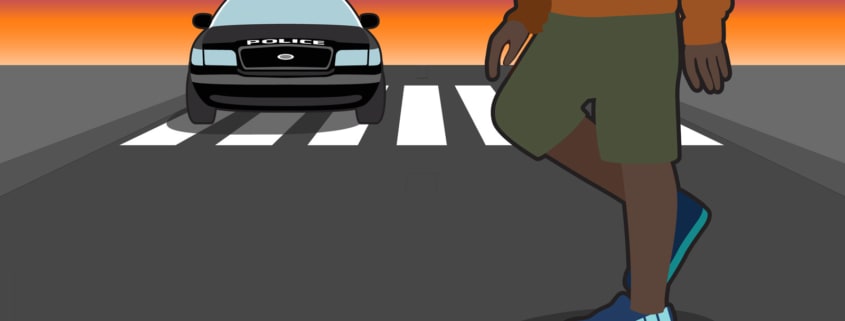Why California Should Decriminalize Jaywalking
This year, CalBike is sponsoring the Freedom to Walk Act (AB 1238, Ting), which will take jaywalking laws off the books in California. We realize that people have questions about why this legislation is critical for equity, justice, and accessibility. In partnership with the bill’s other co-sponsors, California Walks and Lawyers’ Committee for Civil Rights, we answer the most common questions about the Freedom to Walk Act.
Why do we need to reform the way pedestrians cross the street?
- Safe walking should not be criminalized.
- Jaywalking laws lead to unjust enforcement and burdensome fines and fees.
- Jaywalking laws give rise to pretextual policing.
- Pedestrian infrastructure is inadequate, especially in low-income communities and communities of color. Jaywalking rules tend to punish people for what is actually a collective failure to invest in our neighborhoods.
Won’t removing jaywalking laws make the streets less safe for pedestrians?
- No. In fact, removing jaywalking laws will make it safer for pedestrians, especially Black, brown, and low-income pedestrians, by ending unnecessary police encounters that can lead to police brutality.1
- People will still be prohibited from crossing the street in reckless or hazardous ways.
- Most crashes involving pedestrians are due to drivers violating traffic laws.
- Even if jaywalking were unsafe (in almost all cases, it is not), tickets and fines have no deterrent effect, so getting rid of them won’t increase jaywalking.
How will decriminalizing jaywalking affect the safety of children and the elderly?
- Children under 13 are typically supervised by an adult when crossing the street. This bill will not affect the guardian’s responsibility to ensure that children cross the road safely.
- California empowers teenagers to make decisions far more complex than how to cross the street. If we can trust teenagers can drive, we can trust them to assess when crossing the road will be an immediate hazard. Like anyone else, if they do not exercise good judgment, they will be subject to citation.
- This bill will increase the safety of Black and brown youth, who are often targeted by police for jaywalking.2
- The elderly are just as rational and logical as any other adult. Regardless of the Freedom to Walk Act, they will choose to cross the street only when they conclude that it is safe for them to do so.
1 See, for instance, the tragic death of two Black pedestrians in 2018 and 2020, Chinedu Okobi and Kurt Reinhold.
2 See, for example, this account of police officers in Kern County using jaywalking laws as a pretext to stop, harass, and attack four high-school students.
Why should California change pedestrian traffic laws and not similar laws for motorists?
- Driving is a privilege; walking is a right.
- Drivers cause most pedestrian crashes, so driver enforcement needs to be addressed before pedestrian enforcement. Recent Statewide Integrated Traffic Records System (SWITRS) data shows that driver violations account for over two-thirds of pedestrian crashes.
- Motor vehicles cause the most harm on our roads (due to weight and speed) and generate the most serious consequences.
- Jaywalking laws were invented after motor vehicles began to dominate the right-of-way. They were a tool to limit pedestrian access to the right-of-way and constrain pedestrian activity. It remains the case that jaywalking laws have more to do with protecting the dominance of cars than they do with pedestrian safety.
- Motorists already have substantial protection from laws that they routinely disobey. The ‘speed trap’ law prohibits the enforcement of speed limits that most motorists exceed. AB 1238 merely extends to pedestrians that same protection against enforcement of a law that is routinely and safely disobeyed.
Would legalizing jaywalking undermine pedestrian safety?
- No. Speeding, busier roads, increasingly distracted drivers, lack of safe pedestrian infrastructure, and other driving or road factors are the biggest threats to pedestrian safety. Mid-block crossings or crossing against the light where no cars are coming doesn’t endanger pedestrians.
- Unless we take measures to improve street safety and calm traffic, pedestrian crashes will continue to rise. Rather than responding by limiting and punishing pedestrian activity, we should address the factors that actually give rise to these increased crashes.
- Studies suggest that the design of modern SUVs and trucks is now one of the main culprits in pedestrian fatalities. Higher grills give drivers large front blind spots and cause more severe injuries during collisions with people on foot.
Don’t jaywalking tickets provide important revenue for state and local governments?
- Jaywalking fines and fees are especially difficult to collect.
- Jaywalking citations are disproportionately distributed in low-income neighborhoods; in Bakersfield, for instance, only 17% of census tracts have a median income below $37,404, yet 92% of jaywalking citations were imposed in these low-income tracts.
- Those cited for jaywalking are likely to be indigent, so research suggests that collection efforts are much less likely to be successful.
- Aside from the difficulty collecting jaywalking fines, it is simply not equitable for state and local governments to rely on our lowest-income residents for revenue generation.
- Revenue enhancement should never be a reason for the enforcement of laws. Public safety should.
If you support the repeal of unjust and illogical jaywalking laws, tell your California Senator to vote YES on AB 1238, the Freedom to Walk Act.




